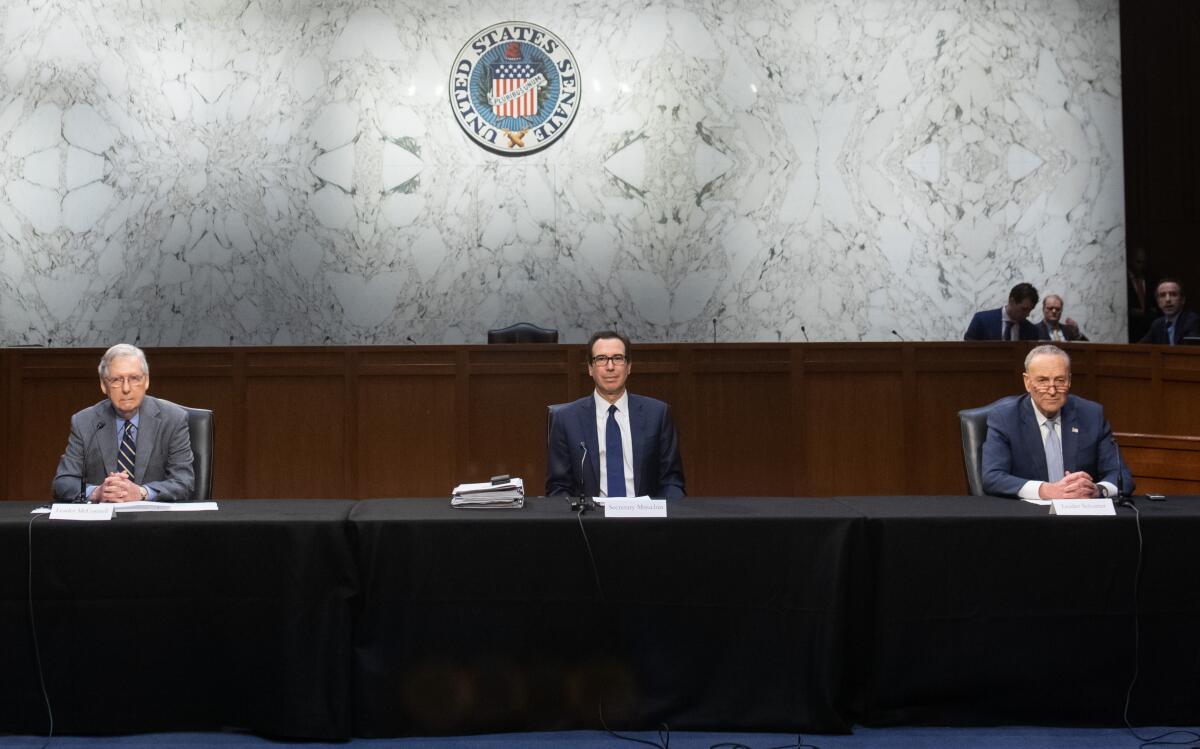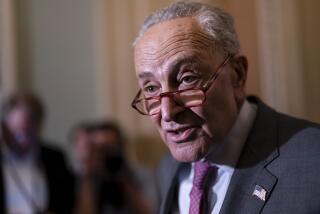Actually getting the coronavirus stimulus bill right would be worth the delay

- Share via
The Senate and the people who watch it obsessively have gotten into a lather over how long it’s taking to pass another, considerably larger, bill to boost the U.S. economy during the coronavirus outbreak. But as former Federal Communications Commission Chairman Reed Hundt observed in The Times Tuesday, the process isn’t important — the substance is.
Which is why I’m struck by how Democrats and Republicans have flipped roles so completely. In 2009, Democrats (who were in the majority at the time) were in a pants-on-fire hurry to pass an $800-billion stimulus package, and Republican argued that the money was excessive and poorly targeted. Now, Republicans (who control the Senate) are seemingly racing against time to pass a stimulus measure at least twice as big, and Senate Democrats are the ones saying we have to be more careful how it’s spent.
At least House Democrats are still acting like themselves, proposing a stimulus package filled with extraneous liberal-agenda items such as forgiving student loan debt and increasing tax credits for poor families. Never let a crisis go to waste, people!
(The House proposal seems to be more of a shot across the bow than an actual legislative document. It may just be Speaker Nancy Pelosi’s way of reminding Senate Republicans of what the House could bring to a conference committee if the Senate didn’t pass a truly bipartisan stimulus bill.)
Anyway, Congress’ track record on stimulus measures provides ample reason for caution. The measures passed in 2008 and 2009 may have prevented the last recession from turning into a depression, but they certainly didn’t spark a vigorous rebound. Even though the 2009 bill, the American Recovery and Reinvestment Act, is credited with helping to create millions of jobs, its effort to advance Democratic policy goals (such as prodding doctors and hospitals to make the shift to electronic health records and promoting zero-emission cars) diluted its stimulative power.
The framework laid out by Senate Republicans appears to be tailored to the unusual circumstances we face, rather than a run-of-the-mill business-cycle downturn. The U.S. economy was chugging along at a steady if unspectacular pace when the coronavirus hit, disrupting global supply chains and then triggering a cascade of state and local restrictions on commerce. It is, in other words, a recession largely caused by government, and as long as the restrictions are in place, no amount of pump-priming is going to make a difference. What many businesses and consumers need is a financial bridge to keep them going until commerce gets back to normal.
The Senate proposal attempts to provide that bridge through several different mechanisms, including loans to help businesses keep workers employed, larger benefits for people who lose their jobs, and extra cash to help individuals who may still be working but have lost hours or income. One of the holdups, though, was whether there were enough safeguards in the bill to make sure the money would flow to the people most affected by the virus-induced problems, as opposed to helping the most politically connected supplicants or rescuing companies from problems that predated COVID-19 (such as Boeing’s 737 Max sales slump).
Considering how much money Congress is preparing to throw at the problem — Treasury Secretary Steven Mnuchin has said more than $2 trillion, a jaw-dropping sum that’s nearly 10% of U.S. GDP — spending a few extra days to make sure it winds up in the right hands seems like a small price to pay. Yes, the need is urgent and immediate. But wasting money isn’t going to help the economy or the people who need a lifeline.
That’s why Senate Democrats were right to hold out for at least one of the things they sought: more oversight over a massive new loan and loan guarantee program for businesses and industries harmed by the outbreak.
Illustrating the problem, President Trump suggested Monday night there was no need for any extra scrutiny over the new $500-billion lending program Senate Republicans were proposing. “Look, I’ll be the oversight. I’ll be the oversight. We’re going to make good deals. We make good deals,” he said at the daily coronavirus task force briefing.
That wouldn’t be reassuring regardless of who was in the Oval Office. Happily, the White House has agreed to have an inspector general and an independent board review the loans, the Washington Post reported Tuesday. Granted, that may not stop the government from making some bad choices with its loan dollars, but at least there will be accountability and the chance to crack down on fraud and abuse after the fact.
The Senate may pass its bill as soon as Tuesday. And as Senate Majority Leader Mitch McConnell (R-Ky.) observed that morning, we’ll soon forget the acrimonious debate over this bill and focus instead on what it does.
More to Read
A cure for the common opinion
Get thought-provoking perspectives with our weekly newsletter.
You may occasionally receive promotional content from the Los Angeles Times.










